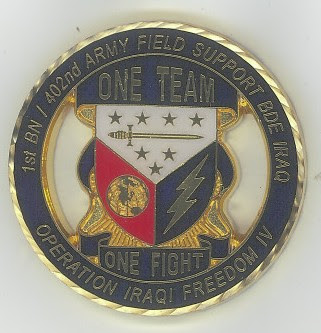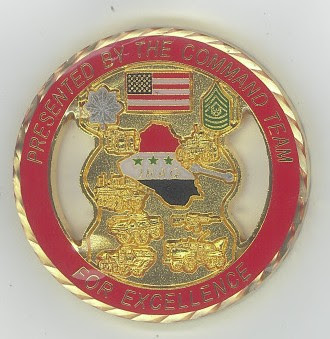
I've flown in and out and about Iraq via many different aircraft methods since I've been here. I've been on a C-5 when we shot flares and I've been over BIAP (Baghdad International AirPort) in an AN-24B aircraft (with a Russian crew) that had bullet holes in it. BTW, an AN-24B is Russian made and about 30 years old and is still in use in much of the Third World. Iraq (the whole damn country) is still 'hazardous duty' (which is why Foreign Service Agents are protesting being forced to serve in Baghdad) and for good reason. Every now and then an aircraft gets shot down. I've had to think about that a few times but never have had a close call. A few months ago a woman in the office where I am located had just such a 'close call'. She wrote up a great summary of the experience and I've shared such here. I still wonder how I'd do in such a situation and I've told my boss several times that I will never hesistate to get on any aircraft and fly anywhere I'm told to go. To me it's all part of the experience. (If you're wondering what happened to the downed aircraft after it was evacatuated...well... that's what 500lb guided bombs are for!)
By Melissa, 402nd AFSB S6 OfficeLSA ANACONDA, Iraq - There is nothing scarierthan knowing something bad is about to occurand all you can do is helplessly watch it takeplace. That happened to me, a DA Civilian, whenthe helicopter I was riding in, returning fromBaghdad to Balad was shot down somewhere inthe middle of the night.I was experiencing the awe of flyingthrough the warm night. I was staring out the window,admiring the glow of the full moon on thecountryside, dotted with lights from the smallscattered dwellings. The sister ship was bringingup the rear and I could see it silhouetted darklyagainst the moonlit night sky. In my mind I wasframing it like a photographer would set up aphoto shoot.While I was mentally lining up the shot, thepilot gradually changed his heading to the rightand I lost the view of the moon and the partnerchopper. The other pilot shifted from the left andtook over the lead position on the other side ofthe aircraft. Within a minute or two, I saw a redglow and tracers, which I mistook for the warningflares that the helicopter would release for missiledeflection, but they were going in the wrong direction.Through the gap between the door andthe floor of the chopper and through the window, Isaw more lights on the ground, redder than anynormal flame. I felt a small jolt which felt like itwas right beneath my feet, and saw something flyby the window. I smelled a strong odor of gunpowder,reminiscent of the smell of 4th of July fireworks.The gunners started firing short, sharp popsthat seemed to last forever, bursts punctuated byshort pauses. After a while, I could not tell if itwas coming from our gunners or we were beinghit. Time was misbehaving, becoming unpredictable,moving slowly, quickly and stopping altogether.It was my impression that most of theaction happened on the other side of the chopper.I did lean over to look, and saw tracers firingin rapid succession from that side.Despite damage, the pilot kept the helicopterheaded away from the ground fire to get asmuch distance between us and the insurgents.He handled the aircraft so skillfully that there wasno swaying from side to side. The vibration thatstarted after the first direct hit became more noticeableand was followed by the downward tilt ofthe chopper tail. Since I was in a rear facing seat,I was pushed away from the back of the seat. Ilooked out the window and saw the ground gettingcloser. “Why are we landing? Are we stoppingto engage with the enemy?” Not being at allversed in military maneuvers and helicopters ingeneral, I was unaware that we were landing becausethe chopper had been severely damaged.As we lost altitude, I could tell from thosearound me that we were in serious trouble. Thepilot brought his bird down as gently as if he waslanding on the tarmac. When we touched downeveryone worked to remove their restraints. Itook off my belt and gave the thumbs up whenthe crew member asked me if I was ok. We werethen commanded to produce our weapons. Everyonewas asked, “Do you have your weapon?”“NO”, I said multiple times, I’m a civilian and Idon’t have a weapon. At that point, someoneshoved a rifle at me, asking me, “Can you firethis?” Me? A rifle? I can’t, I’m not trained, I ama just a civilian.I did my very best to stay out of the way ofthe crew and the other soldiers on the mission. Iwatched as they all set up a perimeter around ourhelicopter. I thought, “This is just like watching amovie.” Everything was choreographed by someoneabove us. When were we going to hear theword “CUT!”? The helicopter sitting in the centerof the moonlit field surrounded by soldiers onguard was surreal. I huddled on the floor of thehelicopter, barricaded my position with dufflebags, kept my head down and said my prayers.I was aware of our mission partner circlingus, protecting us from further assault. Soon therewere other sounds of faster birds, Apaches comingto draw off and return fire. After a while, aBlackhawk landed across the field. I can’t tellhow long this all took because time felt like it wasspeeding and crawling at the same time.We were told to head over to the other aircraft.We piled in as best we could. I tried to getsituated, giving one of the gunners room to sit.All the while I was thinking, “We’re so heavy we’llnever get off the ground!” I had an image of usflying back to base, just high enough to miss thetree tops. As quickly as the time passed duringthe first part of the mission and the time on theground, the last leg to Balad lasted an eternity. Irealized I was holding my breath so I could getthrough it. Finally, we touched down in Balad. Iwas thankful to stand on safe soil and breathe easily















